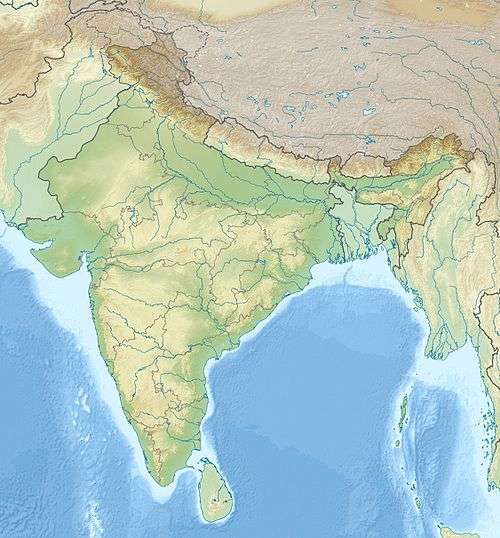Dul Hasti Hydroelectric Plant
| Dul Hasti Dam | |
|---|---|
 Location of Dul Hasti Dam in India | |
| Country | India |
| Location | Kishtwar, Jammu and Kashmir |
| Coordinates | 33°22′06.69″N 75°47′55.66″E / 33.3685250°N 75.7987944°ECoordinates: 33°22′06.69″N 75°47′55.66″E / 33.3685250°N 75.7987944°E |
| Purpose | Power |
| Status | Operational |
| Construction began | 1985 |
| Opening date | 2007 |
| Dam and spillways | |
| Type of dam | Gravity |
| Impounds | Chenab River |
| Height | 70 m (230 ft) |
| Length | 190 m (620 ft) |
| Spillway capacity | 8,000 m3/s (280,000 cu ft/s) |
| Power station | |
| Name | Dul Hasti Hydroelectric Plant |
| Coordinates | 33°17′13.20″N 75°45′42.48″E / 33.2870000°N 75.7618000°E |
| Commission date | 2007 |
| Turbines | 3 x 130 MW Francis-type |
| Installed capacity | 390 MW |
Dul Hasti is a 390 MW hydroelectric power plant in Kishtwar district of Jammu and Kashmir, India built by NHPC. The power plant is a run-of-the-river type on the swift-flowing Chenab River in the Kishtwar region, a rugged, mountainous section of the Himalayas, and several hundred kilometers from larger cities. It consists of a 70 m (230 ft) tall gravity dam which diverts water through a 9.5 km (5.9 mi) long headrace tunnel to the power station which discharges back into the Chenab. The project provides peaking power to the Northern Grid with beneficiary states being Jammu and Kashmir, Punjab, Haryana, Uttar Pradesh, Uttarakhand, Rajasthan, Delhi and Union Territory of Chandigarh. It was constructed between 1985 and 2007.[1]
Background
Begun in 1985, the Dulhasti Power project, set in the northern Indian provinces of Jammu and Kashmir, represents an example of a disaster in project cost estimation and delivery. As initially conceived, the project's cost was estimated at 1.6 billion rupees (about $50 million). By the time the contract was let, the cost estimate had risen to 4.5 billion rupees and later successively to 8, 11, 16, and 24 billion rupees (nearly $750 million). The project became operational on 7 April 2007 and has been generating 1907 Million Units of electricity in a 90% Dependable year[2]
Contracting and design
The contract for the power generation project was first awarded to a French consortium at a price of $50 million, who almost immediately asked for an upward price revision. The site was intended to capitalize on the proximity to a large river systems capable of providing the water capacity needed to run a hydroelectric plant of Dulhasti's dimensions. Unfortunately, the site selected for the project came with some serious drawbacks as well. First, it was sited in the disputed border region between Pakistan and India. Jammu and Kashmir have been the epicenter of numerous and serious clashes between separatist forces demanding independence and Indian army units stationed in the region to maintain Indian military occupation. Constructing such an obvious target as a power plant in the disputed area was sure to provoke reaction by nationalist groups, using terrorism as their chief means of opposition. Thus, the additional costs of providing security to the site quickly became prohibitively expensive. A second problem concerns the sheer geographical challenge of creating a large plant in a region almost totally devoid of supporting infrastructure, including an adequate logistics network (roads and rail lines). Building the plant in the foothills of the Himalayas may be scenic, but it is not cost effective, particularly as almost all supplies had to be brought in with air transportation, at exorbitant costs. All raw materials, including cement, wood, stone, and steel, had to be hauled by helicopter for miles over snowbound areas.
See also
- Ratle Hydroelectric Plant – under construction downstream
References
- ↑ "Dul Hasti dam and Hydroelectric Power Project". Tractebel. Retrieved 15 June 2013.
- ↑ http://www.nhpcindia.com/Projects/english/Scripts/Prj_Introduction.aspx?vid=16
Sources
Pinto, Jeffrey K. (2009). Project Management - Achieving Competitive Advantage (Custom Edition). Upper Saddle River, New Jersey: Pearson. ISBN 978-0-558-20289-7.